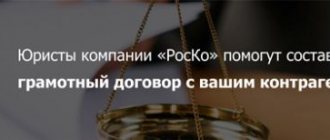Types of audit
They are classified into several types:
- By category: independent, with reporting analysis carried out by a third-party special organization on a contractual basis;
- state, that is, the inspection is carried out by order of official services;
- internal, while creating a special system for monitoring the correctness of accounting.
- general;
- mandatory, that is, carried out in some organizations annually in accordance with the legislation of the Russian Federation;
Main goals and objectives of the audit
An audit is a procedure for an independent assessment of the state of an organization’s finances. The main purpose of an audit is to identify errors in financial statements and provide the manager with objective and accurate information about the state of his company's documentation. Thus, the procedure is aimed at collecting, studying and analyzing all business transactions carried out by the audited entity during the reporting period, with a view to their correctness and accuracy reflected in the documents.
The main purpose of an audit is to verify the reliability of statements, and the main condition for its implementation is the independence of the auditor. The result of the audit is officially recorded in the prescribed form, which is the competent opinion of the auditor about the degree of accuracy of the financial information contained in the reports for a certain period, that is, the audit report.
The purpose of the audit is to verify statements, confirm or refute the reliability and correctness of the information contained in the reporting.
Essentially, auditing is monitoring the accuracy of information in existing reports. The main condition for success in carrying out such work is the involvement of an independent specialist who can conduct inspections impartially.
Completion of the auditors' work is a conclusion in the form of a conclusion, which records the opinion of the inspection body regarding the correctness of the information in the company's reports.
The audit report is prepared in a special form and contains complete information about the results of the audit. Based on the available data, it is easy to determine the competence of the company’s accountants and identify attempts to deceive regulatory structures. In practice, audits carried out by independent bodies monitor compliance with laws and regulations, as well as the absence of violations.
The main objectives of the audit in the company are:
- checking and confirming the correctness of the information reflected in the financial statements of the organization;
- detection of violations and subsequent reference to them (if necessary, they can be eliminated);
- obtaining accurate information about the company, as well as the state of accounting in it and in the documentation.
Legal basis of regulation
The concept of an audit, certification requirements, the rights and obligations of individuals, and the responsibilities of organizations are defined in the main document regulating such activities in the Russian Federation - this is the Federal Law of December 30, 2008 No. 307-FZ “On Auditing Activities”.
There are also federal rules (standards) for this activity. The main purpose of the document is to establish uniform audit standards and standardize procedures. This is necessary so that the inspection participants throughout Russia understand the essence of the process, as well as for the possibility of resolving disputes in arbitration court.
These standards explain the principles of verification and the rules for drawing up conclusions. With their help, the methodology, scope, and depth of the audit are determined.
International standards are the supranational regulation of activities. They were developed by the International Federation of Accountants with the aim of standardizing audits, unifying documents, and creating uniform requirements for audit quality. Standards regulate the rights and obligations of persons, define control objectives, evidence, necessary documentation, as well as rules for drawing up audit reports.
Audit Planning Basics
There are several stages in organizing audit planning:
- a formal proposal from the client to conduct an audit;
- initial acquaintance with the characteristics of the company, its financial indicators without a detailed check;
- development, implementation and drawing up of a comprehensive plan and the formation of a specific audit program;
- drawing up a letter about the inspection;
- certification of the audit agreement by two parties.
In general, the purpose of audit planning is to identify:
- subject of research and list of objects under study;
- a list of questions for each inspection object;
- information sources;
- working conditions;
- structure of the group of inspectors;
- timing of the program and implementation.
An audit program is a detailed document that develops a general plan and contains a list of audit procedures.
Who conducts it?
Activities to verify reporting can be carried out by audit organizations and individual auditors. They must be a member of an accredited SRO (self-regulatory organization). In addition, there are a number of requirements:
- Individual auditors are required to: obtain a higher economic or legal education;
- have at least three years of experience as a chief accountant or assistant auditor;
- pass the exam and receive an auditor certificate.
- a commercial;
If you are interested in how often a desk tax audit is carried out, read this material. You will find detailed information about the procedure and timing of an on-site tax audit here.
How to choose an audit organization
In a joint-stock company, the auditor is selected by voting at the meeting of shareholders. As mentioned earlier, if a company’s capital consists of more than a quarter of state capital. property - then the audit organization is selected through a competition.
If you are a director of a company and you want to find a good auditing firm, pay attention to two main characteristics: professional and formal.
Professional characteristics consist of three main points:
- A good control system that allows you to clearly and correctly perform your own functions.
- The presence of certain verification standards.
- Qualified personnel. The formal characteristic concerns the compliance of the organization’s activities with established legislation. The audit firm must follow him.
- Not to be a public joint stock company.
- Have 50% of employees be citizens of the Russian Federation who permanently reside in Russia.
- Provided that the director of the organization is a foreigner, then at least 75%.
- The company must have at least 5 professional auditors.
- Have a license.
- Must be insured against the risk of breach of contract.
The following are not entitled to conduct an audit:
- Auditors who maintain financial statements for a given company.
- Auditors who are closely related to someone in the organization's management or accountants.
- Auditors who helped prepare financial and financial statements for three years.
What are they checking?
Depending on the type of audit, the list of documents to be checked may vary:
- During mandatory analysis, all accounting statements and financial documentation are subject to assessment of reliability. You cannot refuse a specialist. If you do not provide him with documents, then, depending on their significance, the inspector may refuse to check. If documentation is lost, the auditor's decision depends on its importance. If you refuse to draw up a conclusion, the accuracy of the reporting will not be confirmed; internal and external users of the information may decide that the organization is hiding some accounting details.
- During a voluntary audit, control is carried out only on those issues that are specified in the contract and letter of commitment. For example, only accounting for cash transactions, settlements with the budget or with buyers and customers, fixed assets, intangible or current assets can be assessed. In this case, the specialist will request all documents relating to the specified individual areas and will express an opinion only regarding them.
What awaits you for refusing an audit?
An organization subject to a mandatory audit must be aware of the responsibility for failure to perform such work. In certain circumstances, companies that undergo voluntary audits may be penalized. Let us highlight the main violations and consequences:
- Late submission of auditors' conclusions to the statistics body. Punishment for such an action is provided for in Article 19.7 of the Code of Administrative Offenses of the Russian Federation. Violation entails penalties from 100 to 300 rubles for citizens, 300-500 rubles for subjects in office, and 3000-5000 rubles for legal entities. The violation may be intentional or done through negligence.
- Refusal to publish the auditors' report on the JSC's website on the Internet within the period specified by law. The punishment for such a violation is prescribed in the Code of Administrative Offenses (Article 15.19). In this case, the enterprise is punished with a fine of 0.7 to 1.0 million rubles, and persons in office - 30-50 thousand rubles.
- Refusal to enter data on the results of the audit or their untimely transfer. Responsibility for such a violation is provided for in the Code of Administrative Offenses of the Russian Federation (Article 14.25). Depending on the situation, the fine ranges from 5 to 50 thousand rubles. Repeated violations may result in disqualification for a period of 1 to 3 years.
- Lack of auditors' report within the period established for storage. Liability is provided for in the Code of Administrative Offenses of the Russian Federation (Article 15.11). It states that such a violation entails a fine of 5 to 10 thousand rubles. If the offense is repeated, the fine increases to 20 thousand rubles.
Authorized bodies monitor compliance with legal requirements and punish offending companies with a fine or disqualification for a certain period.
Is an audit required?
For most organizations, such checks are optional. Only the reporting of the largest enterprises that involve the finances of the population needs to be confirmed. The purpose of the event is to reduce the risk of dishonest actions by companies and ensure the protection of citizens from deception and fraud.
An annual audit is required in the following cases:
- Organization - joint stock company. Recent amendments to the law oblige to check the statements of all companies, regardless of their type, financial indicators and type of activity. Thus, both CJSC and OJSC are subject to control.
- The company's securities are traded on the stock exchange.
- An organization - a credit, insurance, clearing, is a non-state fund or operates with the finances of the population.
- An enterprise presents or publishes consolidated financial statements. The exception is government agencies.
- The volume of revenue for the previous year exceeds the amount of 400 million rubles, or the balance sheet asset at the end of the reporting period exceeds 60 million rubles.
- Other cases determined by law.
Verification of the statements of these enterprises can only be carried out by audit organizations. If the state's share in the authorized capital is 25% or more, then the contract for the provision of services is concluded after a tender.
When is a statutory audit necessary?
According to the requirements of current legislation, an external audit must be carried out every year. JSCs, insurance companies, securities market participants, credit companies and gambling organizers are subject to control. In addition, enterprises that issue securities, as well as organizations whose profit volume for the last reporting year exceeded 400 thousand rubles, and the volume of assets in the balance sheet exceeded 600 thousand rubles, are checked. The exceptions are agricultural unions, unitary, and state enterprises.
Audit control is performed according to the following scheme:
- The annual audit is one-stage.
- Check for a quarter, 6 or nine months - in several stages.
In the latter case, the audit is faster, and there are no difficulties in identifying violations. As a result, less time is spent on reporting and other work. The manager has time left to correct existing errors that were made in the process of activity and identified by auditors.
Duration and frequency
The period for conducting a voluntary audit is established in the contract. It depends on some factors:
- enterprise size;
- presence of branches, representative offices;
- duration of the company's operation;
- sample size;
- quality of accounting.
If the audit is mandatory, then the timing is also discussed. As a rule, in this case, the analysis is carried out no more than two months. On average, control lasts one or two weeks.
The audit is carried out once a year , regardless of its nature.
Types of audits
An audit of financial statements can be:
- mandatory (annual);
- on the initiative of the head of the organization (enterprise).
In the second case, an audit initiated by the director of the enterprise may be aimed at identifying an unscrupulous employee or for reinsurance. In such a situation, the reporting audit may be selective. The reviewer will not review all documents, but only some of them (for example, interim reports).
Order of conduct
There are four interrelated stages in audit practice:
- Preliminary activities . At this stage, the auditor gets acquainted with the enterprise, studies its constituent documents, and assesses risks based on certain factors:
- industry;
- production growth rates;
- staff turnover;
- qualifications of accounting staff, etc.
financial position;
If the audit organization is satisfied with all the conditions, then it sends a letter of consent to the customer.
- preliminary planning, when the auditor and the customer enter into an agreement, set the timing and cost of the audit, and the composition of specialists;
- collection of audit evidence, that is, primary documentation, information from third parties, etc.;
You can learn more about this procedure from the following video:
Audit chipboards: preparing for inspection
Natalya KALOKHINA
A positive audit result depends on quality preparation. But so that preparation does not take a lot of time and effort, it must be done wisely. The easiest way is to find out in advance how and what auditors check, and put things in order in the “right places.”
Neither friend nor foe
Accountants often imagine an audit as a type of tax audit.
The only difference is that this inspection does not threaten fines, penalties, penalties and is carried out for money. But it will bring no less troubles and troubles. However, this idea is far from reality. In fact, auditors come to the company not as controllers, but as independent experts. Their goal is to attest to the reliability of financial statements and confirm that the organization’s accounting is conducted in accordance with Russian legislation. At the same time, they are not interested in “digging up” as many minor errors and violations as possible. The auditors' task is to identify only significant misstatements in the financial statements as a whole. In auditing practice, there is even a special concept in this regard – the level of materiality. This means that the auditor evaluates only those aspects of the company’s business activities, the incorrect accounting of which could lead to a significant distortion of the statements. And factors that do not have such a total impact on the financial statements usually do not receive an audit at all. In addition, if the auditor still finds serious mistakes in your work, this is not a death sentence. The accountant can promptly correct any deficiencies found. And as a result, get a positive audit report. “As practice shows, regardless of the level of qualifications of accountants, there is no absolutely correct accounting and tax accounting,” notes Andrey Kosov, general director of the consulting company “Kosov and Partners.” – Inaccuracies arise constantly. And because of the incorrect distribution of responsibilities between accounting employees, and because of the imperfection of accounting computer programs, and because of a misunderstanding of the law. By identifying errors, the auditor makes recommendations on how to correct them. This allows us to improve the work of accounting and prevent possible future claims from tax authorities.” So it turns out that the auditor is rather a friendly person for the accountant. And even useful. By pointing out professional mistakes to you, he thereby improves your qualifications. Accounting professional status is under threat
However, you should not approach the audit carelessly.
It does carry some risks for the accountant. They concern the potential to spoil the relationship between accounting and management. The fact is that, based on the results of an audit, auditors usually draw up a report in which they indicate all the identified deficiencies. “We have made it a rule, based on the audit results, to provide the client with a report on the audit carried out as a separate document,” says Tatyana Sviridova, general director of the consulting firm SviriTa. “This is not the audit report itself, but only a preliminary description and analysis of the consequences of discovered accounting errors.” This report is addressed to the company's management. It is not mandatory and is not even required by auditing standards. However, in practice, most audit firms compile it. Thus, they demonstrate the level of their professionalism and trusting attitude towards the client. Thus, despite the fact that the accountant will subsequently correct most of the violations indicated in the report, the director will still already know about them. And the accountant’s reputation in the eyes of his superiors will be slightly tarnished. And if the errors found were gross and their elimination threatens the company with loss of money, then it’s not far from dismissal. To prevent such an unfortunate misunderstanding from happening to the accountant, he should clean up his “kitchen” even before the auditors arrive. How auditors check
When preparing for an audit, do not overdo it.
There is no need to re-shovel the entire primary data of the period under review. After all, no one will “over and over” review your business transactions. Therefore, accounting needs to be “improved” selectively. And in order to “select” for erasure the same thing that auditors will be interested in, you need to know the specifics of conducting an audit. This is what it boils down to: Since the auditor’s task is to identify significant distortions in reporting, he checks only transactions that are significant for a given company. That is, for verification, he will select documents, firstly, for the most typical transactions. Secondly, for transactions involving significant amounts. This is normal auditing practice as set out in auditing standards. Thus, first of all, the accountant needs to double-check those areas of accounting that record transactions that are for. For example, if an organization is engaged in wholesale trade, then the main attention should be paid to settlements with suppliers and buyers of goods, and transportation costs for delivery. Preventive measures
There are three main stages that an accountant must overcome before starting an audit.
First, get your primary documents in order for all significant transactions. Auditors will definitely look at them and find fault if the primary document is prepared with violations. “The company’s management, when documenting transactions, cannot always foresee all tax risks and possible liability,” says Andrey Kosov. – Therefore, the quality of the primary documentation accepted for accounting is often very low. But the accounting department is forced to take into account what is handed over to it, without being able to interfere in the process. However, auditors do not have the right to ignore such shortcomings.” The upcoming audit is an occasion to finally sort out all the inaccuracies and ambiguities. Contact your counterparties and obtain the missing documents. Replace questionable papers, collect missing signatures and seals, fill in missing details. If you do not do this in advance, the audit may be significantly delayed, since clarifications of this kind will still have to be made, but during the audit process. And it will take a lot of time. And extra time means extra money. The second stage of preparation for the audit is inventory. By “taking an inventory” on the eve of the inspection, you thereby confirm that your accounting is not made up out of your head, but fully reflects the economic activities of the company. Again, if during the inventory process you discover a discrepancy between actual and accounting data, you still have time to make corrections. Although it is required by law to conduct an inventory before preparing annual reports (Article 12 of Law No. 129-FZ of November 21, 1996), many companies approach this responsibility formally. They take inventory only of property, ignoring accounts payable and receivable, work in progress, reserves, etc. “Counterparties quite often have different data on debts to each other,” says the director of the audit and consulting department of Ya.N.S. LLC. Audit” Nikolay Litvinov. – Inconsistency between inventory accounting data and warehouse registers is also not uncommon. Especially if the warehouse is geographically remote from the accounting department. In order to anticipate the detection of such errors by auditors, we recommend that before the audit you check with your main counterparties and with geographically distant divisions. The ideal case would, of course, be to conduct a complete inventory of all assets and liabilities.” In addition, special attention should be paid to documenting the inventory results. The contents of the documents should convince the auditor that the inventory was carried out on its merits. If the auditor suspects that the accountant simply printed and signed standardized forms, he may question the inventory results. At the third stage, the accountant should close the reporting period, summarize the accounting results and generate draft reporting. Accounting statements (balance sheet and second form) are an integral part of the auditor's report (usually directly filed with it). Therefore, when going out for an audit, auditors usually demand that by the time they arrive, the reporting has already been generated, at least in the form of a draft. Zone of Suspicion
Serious audit firms never approach the audit formally. They have special techniques with which they probe for weaknesses in accounting. It is useful for an accountant to know about small audit tricks and, if possible, eliminate problematic issues in advance. The auditor will not like it if the accounting register contains corrections, erasures, reversals and similar inaccuracies. After all, such an unpresentable type of document indicates that the accountant was not confident in his calculations and postings. This means that this area is new to him, and there is a high probability that errors will be found here. And this is a reason to dig deeper in this place. The same can be said about folders with primary documents, which are completely covered with colored bookmarks, with pencil marks in the margins and in the text of the document. These are clearly places where the accountant had doubts. Or I wanted to finish something, but didn’t have time or forgot. Auditors pay attention to accounting transactions that are non-standard for a particular company. Often the accountant does not have enough information to make “exotic” entries correctly. And there is no time left to deal with the daily routine. The same suspicion of incompetence is raised among auditors in areas where the legislation has recently changed. “I should note that very often we work with accountants who are well-versed in accounting issues, but the situation with taxation is not so important,” shares Tatyana Sviridova. – For some reason, many accountants do not work with regulations, laws, instructions at all, but are guided by the opinion of a familiar tax inspector or an accountant who found himself in a similar situation. As a result, the operation is completed incorrectly, repeating other people’s mistakes.” Auditors will pay special attention to accounting, in which the vast majority of entries are made on the last day of the reporting period (month, quarter, year). “Most likely, in this case, accounting is not carried out regularly,” Nikolai Litvinov expresses dissatisfaction. – The accountant, violating the principle of time certainty, quickly compiles taxes and reporting. At the same time, trying, if possible, to also reduce the amount of VAT and income tax due to the budget, at the end of the reporting period they often make unreasonable payments. And to do this, he “draws” fictitious contracts, the qualified execution of which he postpones until later. But as a result, he often forgets to redo them altogether.” The auditor will certainly become interested if he discovers that in an organization the share of costs to total revenue is quite significant. To satisfy his interest, he will check whether the accountant complied with the law when he executed “costly” transactions. The auditor will look at supporting documents confirming costs and check the correctness of cost rationing. And also make sure of the legality of attributing costs to reduce taxable profit. And the accountant will definitely attract increased audit attention if he hesitates and delays in every possible way the display of the requested documents - contracts, acts, other primary documents or accounting registers. Or he will bring the so-called “separate folder”. That is, a folder with contracts in which, as it turns out, part of them is missing. To the corresponding question from the auditor, “Where is the rest?” the accountant replies that “the rest” is stored in another “separate folder” (in the safe, with the general (financial) director). “As a rule, this is a sign of reluctance to show the auditor questionable documents or one’s technical errors,” notes Nikolai Litvinov. – Therefore, the contents of the “separate folder” are subject to the most thorough analysis. It usually contains fictitious contracts, bills of exchange involved in dubious transactions, and salary schemes. Or simply very important documents that cannot be ignored during verification.”








